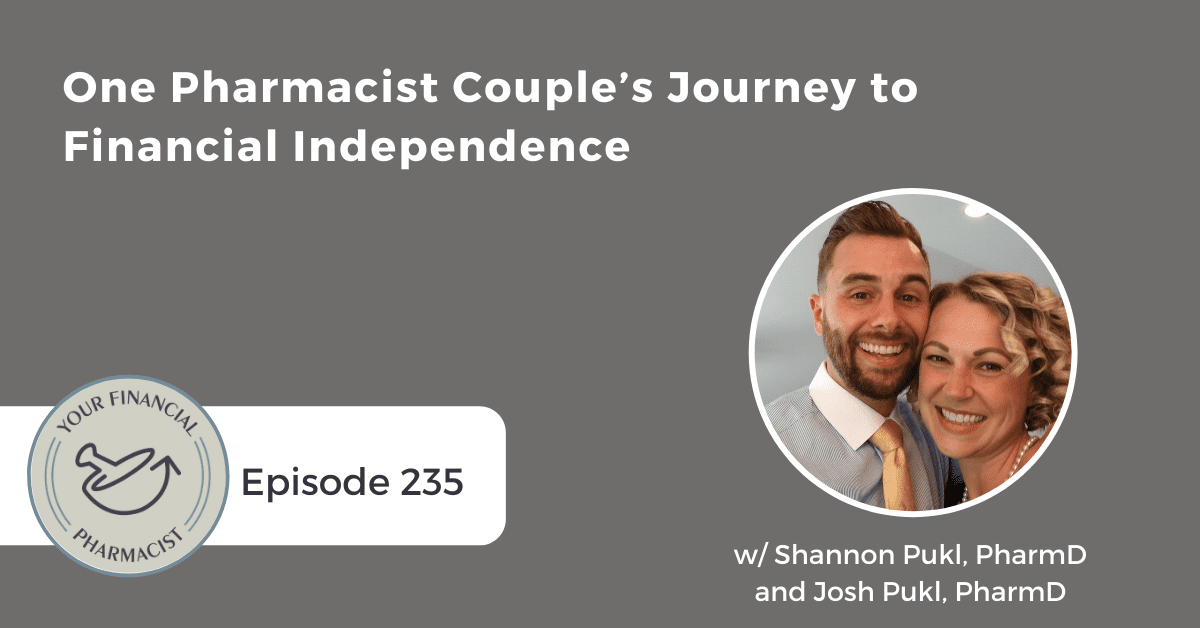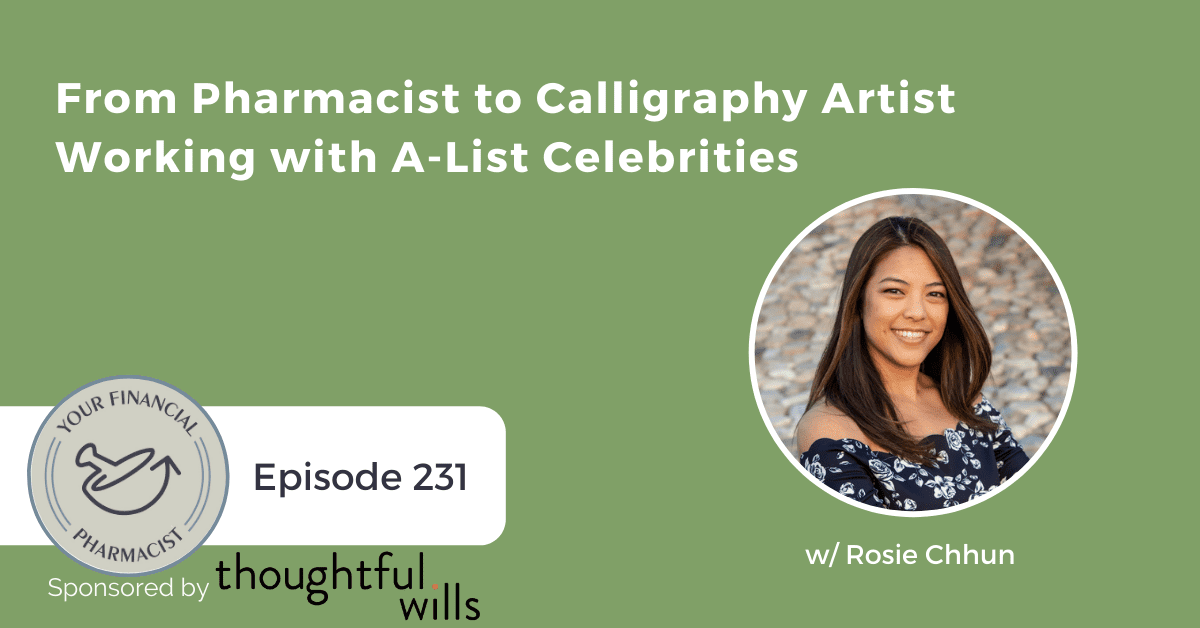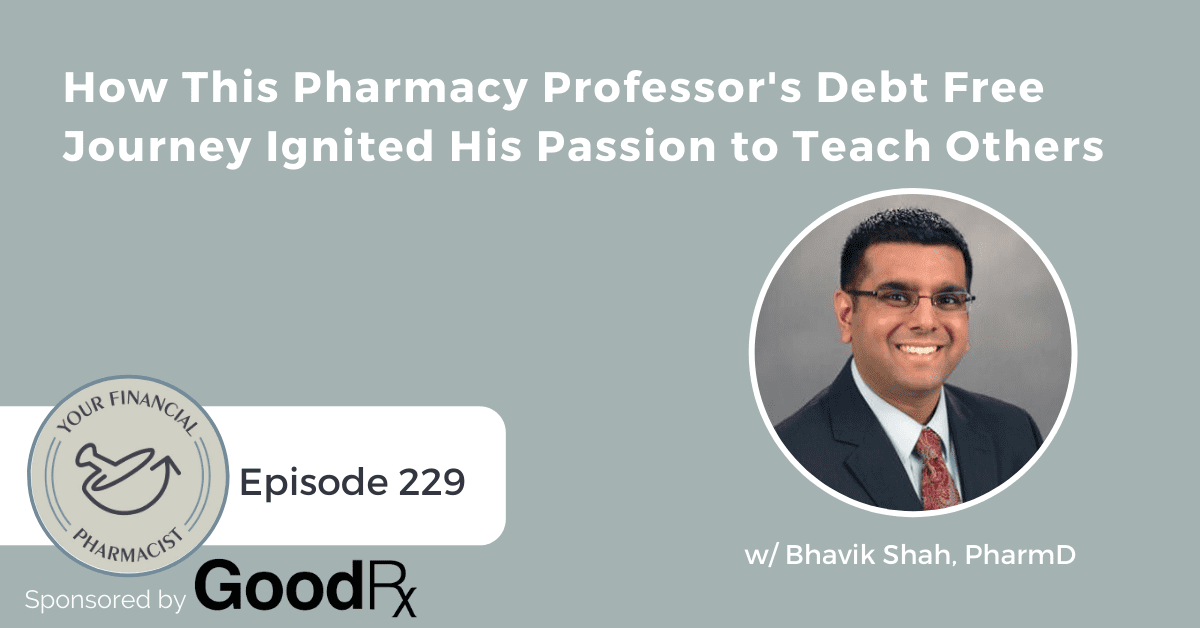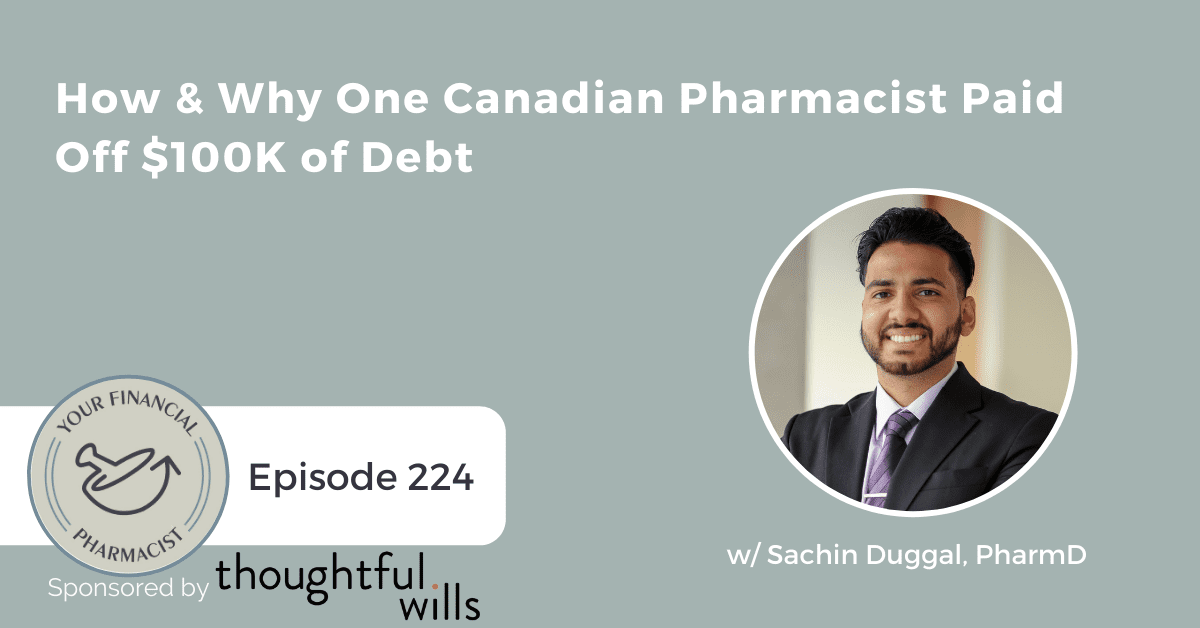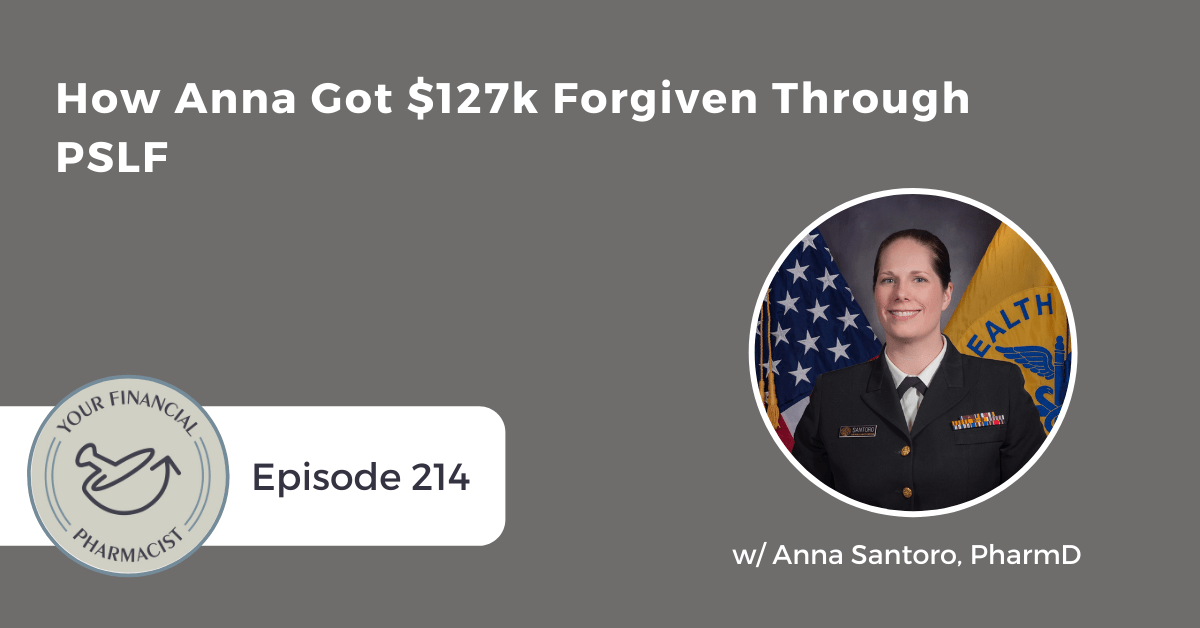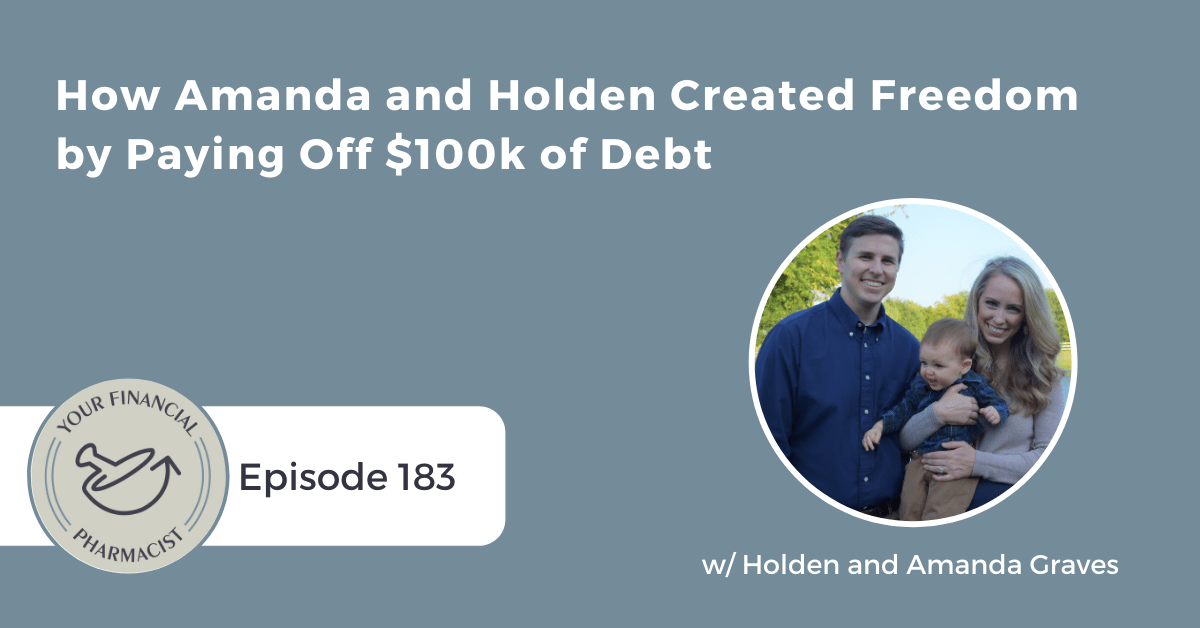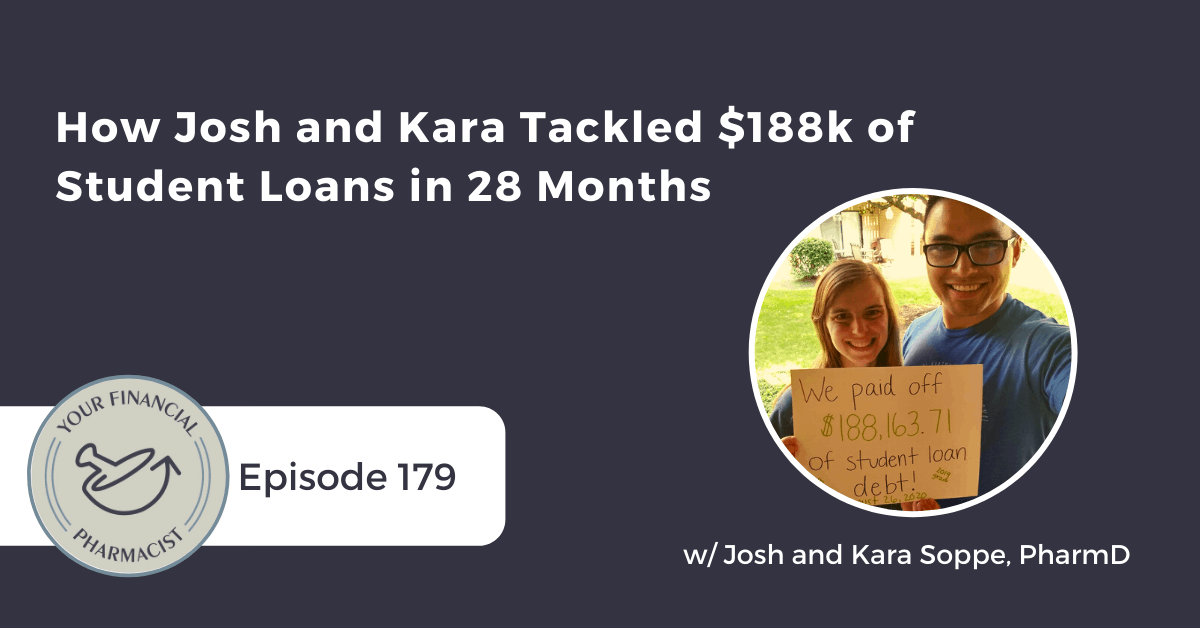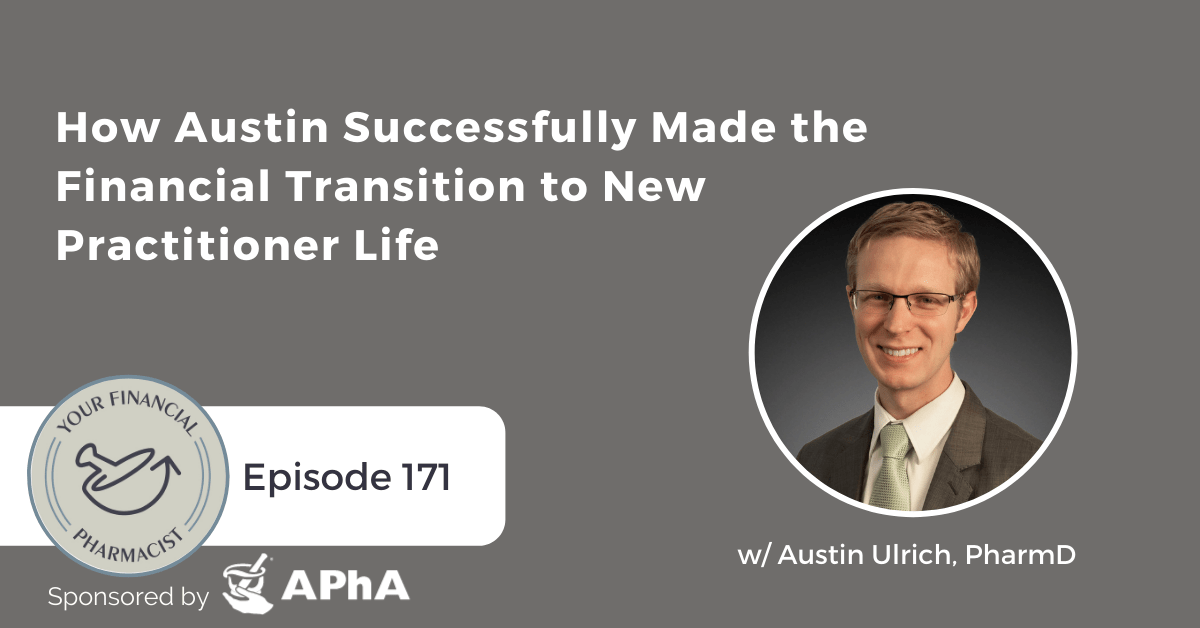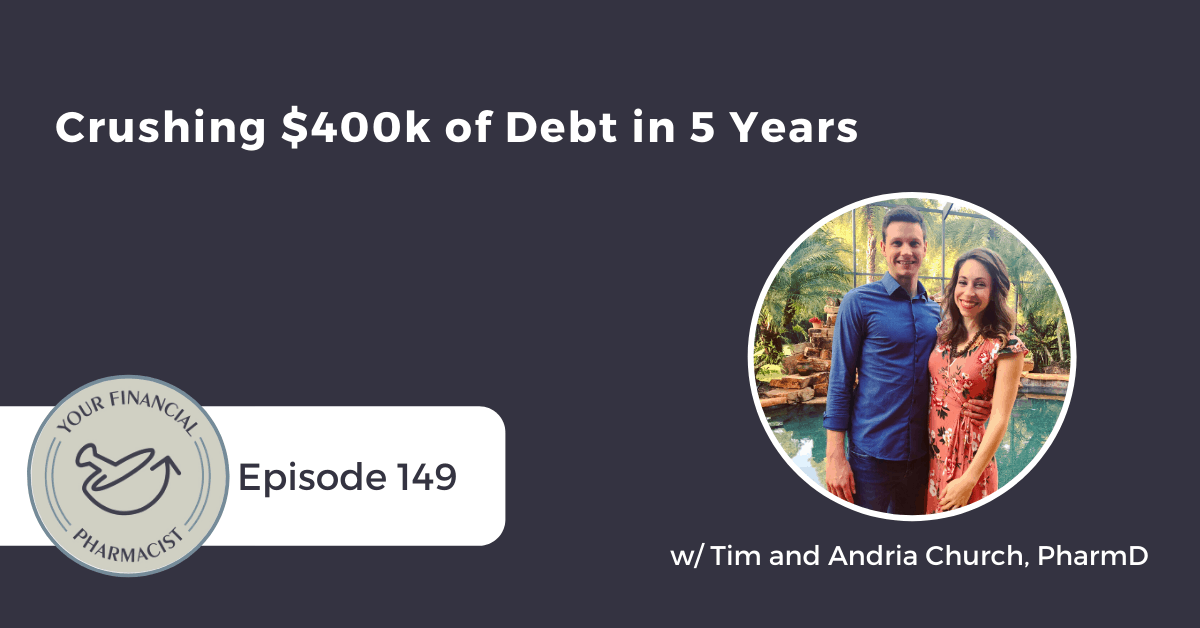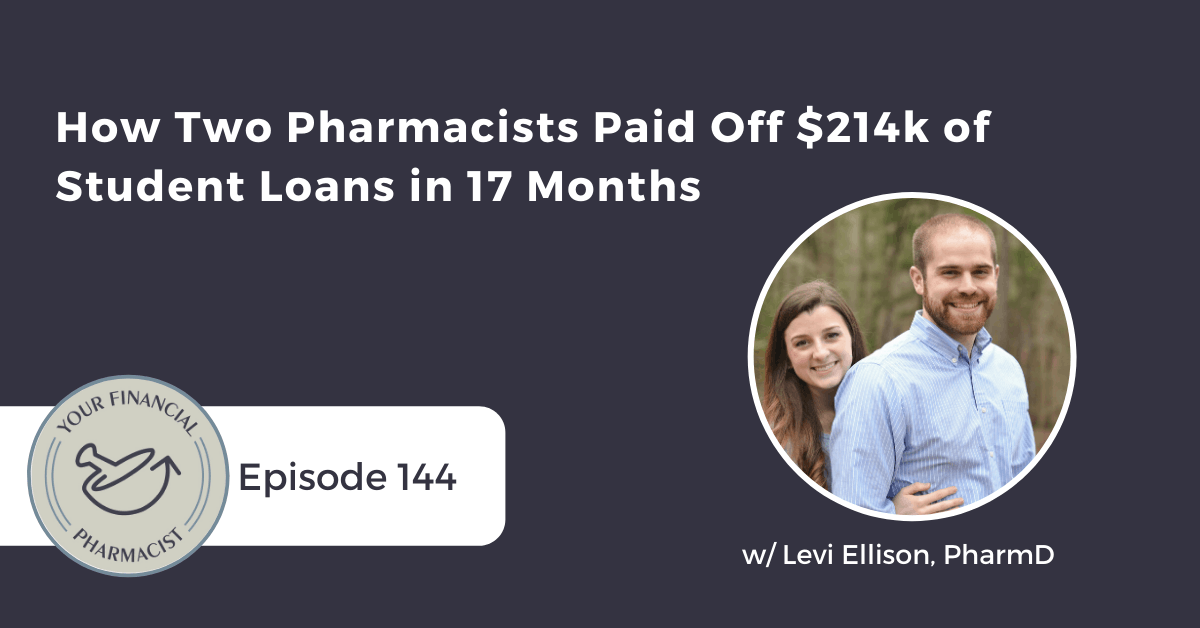One Pharmacist Couple’s Journey to Financial Independence
Josh and Shannon Pukl discuss their journey towards achieving financial independence and the strategies they have employed along the way.
About Today’s Guests
Josh and Shannon Pukl began their pharmacist career paths after graduating from Duquesne University in 2012 and ’13 respectively, but their financial journey didn’t evolve until 2015 after Shannon was diagnosed with breast cancer. Suddenly, life “guarantees” seemingly evaporated into questions, confusion, and unplanned expenses. Working through recovery, relocation and job changes a shift in focus began to sharpen their life ambitions – to be financially independent.
From sifting through several blogs and forum threads, listening to countless podcasts, and devouring financial books Josh and Shannon moved towards making money work for them. After creating an intense budget, dollar-cost averaging into index funds, and putting windfalls to work in the market this disciplined and blessed approach loosened the financial restraints allowing Shannon to be the first to set off on her encore career in entrepreneurship.
As a result, the Pukl’s intend to continue their path to 100%, true financial freedom for both husband and wife to pursue their truest callings and be the best stewards of what they’ve been gifted whether monetarily or otherwise.
Episode Summary
This week, your host Tim Ulbrich had the opportunity to sit down with pharmacists and leadership coaches, Shannon and Josh Pukl, to discuss their journey towards achieving financial independence. This episode is jam-packed with valuable insights, not only relating to mindset and vision casting, but also regarding actionable processes and steps you can take to ensure your financial independence and early retirement! Hear from Shannon about how her 2015 diagnosis with breast cancer changed her outlook on life’s guarantees and how she turned this very difficult situation into a source of motivation to become financially independent. We also discuss some of the strategies that Josh and Shannon have employed and found success in on their journey to becoming debt-free and, finally, what Shannon is doing in her encore career since retiring early from pharmacy. The discussion touches on setting up those passive income streams that will make all the difference, how budget and lifestyle changes allow you to enjoy the things that matter, and even how to prepare for the moment the upswings we’ve been enjoying in the current bull market drop. This is one conversation you don’t want to miss, so tune in now to hear it all today!
Key Points From This Episode
- Shannon and Josh start us off by sharing why each of them got into pharmacy.
- Shannon runs us through her post-school debt and shares gratitude that it wasn’t higher.
- Josh expresses relief for the financial support provided by his parent’s foresight.
- Where they worked after graduation; and a smart move that worked out well!
- How Josh found out about financial freedom by accident and how he got to his ‘why’.
- Shannon shares her history with cancer and the hugely expensive treatment costs.
- How the financial strain created a motivation towards achieving financial independence.
- Josh explains how his faith played a big part in keeping a positive mindset.
- Learning the valuable lesson that money isn’t the most important thing; time and joy are.
- Paying off her student loans as quickly as possible from the moment they came due.
- Top tips and lifestyle changes that the Pukl’s advise for financial independence!
- Setting up their passive income and the importance of having different income streams.
- Shannon talks us through their work with universities around healthcare leadership.
- Your Breast Life; Shannon’s blog to help and support women going through a similar journey.
- Getting her real estate license and considering potential investment opportunities.
- Hear about the ways that Shannon and Josh balance each other out in everyday life.
- Living in a bull market and evaluating where you want to be when the downturn hits.
- Josh casts a vision for their future in growing leadership in pharmacy.
- The Pukl’s each share some parting advice you definitely want to hear!
Highlights
“Something I would encourage all pharmacists to consider is long-term disability insurance.” — Shannon Pukl [0:08:10]
“How do we live a life that we truly enjoy, day in and day out, and that we’re giving back every talent and every gift and every ability that we can to further whatever passion that we may have?” — Josh Pukl [0:12:04]
“We had to switch our mindset away from a scarcity mindset to a mindset of plenty.” — Josh Pukl [0:13:44]
“There is more to life than just your diagnosis. Diagnosis doesn’t define [you].” — Shannon Pukl [0:18:27]
“I think it’s really important to use whatever vehicles are available to you. One of my favorite quotes is kind of simple and it’s kind of silly. It is: ‘When is the best time to plant a tree? It was 20 years ago, but the second best time is today.’” — Josh Pukl [0:26:43]
Links Mentioned in Today’s Episode
- YFP Planning: Financial Planning for Pharmacists
- Mr. Money Mustache
- The Shockingly Simple Math Behind Early Retirement
- Livestrong Fertility
- The Your Financial Pharmacist Podcast
- Healthcare Leadership Certificate Program at Duquesne University
- Your Breast Life
- The FIRE Prescription: How to Retire Early as a Pharmacist
- FIRE Rx: The Pharmacist’s Guide to Financial Independence by Jeff Keimer, PharmD
- YFP 227: Why Tim Baker, CFP® Bought a Depreciating Asset
- Vanguard Total Stock Market Index Fund Admiral Shares (VTSAX)
- Fidelity Index Funds
- Your Financial Pharmacist Disclaimer and Disclosures
Episode Transcript
[INTRODUCTION]
[0:00:00.4] TU: Hey, everybody. Tim Ulbrich here, and thank you for listening to the YFP podcast where, each week, we strive to inspire and encourage you on your path towards achieving financial freedom.
This week, I had the opportunity to sit down with pharmacists, Shannon and Josh, to discuss their journey towards achieving financial independence. A few of my favorite moments from this episode are hearing from Shannon about how her 2015 diagnosis with breast cancer changed her outlook on life’s guarantees and how she turned this very difficult situation into a source of motivation to become financially independent.
We also discuss some of the strategies that Josh and Shannon have employed and found success on their journey to becoming debt-free and finally, what Shannon is doing in her encore career since retiring early from pharmacy.
Before we jump into the show, I recognize that many listeners may not be aware of what the team at YFP Planning does in working one-on-one with more than 240 households in 40 plus states. YFP Planning offers fee-only high-touch financial planning that is customized for the pharmacy professional.
If you’re interested in learning more about working one-on-one with a certified financial planner may help you achieve your financial goals, you can book a free discovery call at yfpplanning.com. Okay, let’s jump into my interview with Shannon and Josh.
[INTERVIEW]
[0:01:22.6] TU: Shannon and Josh, thank you so much for coming on the podcast.
[0:01:24.9] JP: Awesome, thanks so much for having us, Tim.
[0:01:26.9] SP: Excited to be here.
[0:01:28.3] TU: Shannon, you emailed us back at the end of October about finding YFP in your journey to financial freedom and early retirement, which allowed you to move into an encore career and give in to exactly what you’re doing there.
We knew we had to bring you on to the show and I’m excited to have the opportunity to share your journey with the YFP community. Before we dig in to the financial journey, let’s back up to what drew you both to pharmacy school, where you went to school, and when you graduated? Shannon, why don’t you just start us off?
[0:01:57.3] SP: Yeah, absolutely. For me, pharmacy school was really about helping people up until I was a senior in high school. I wanted to be a teacher, I had a great family friend talk me out of that. I stumbled upon pharmacy school with my family, kind of history of cancer. It just really pulled at my heartstrings and so I ended up going to Duquesne University in Pittsburgh.
[0:02:16.6] TU: Awesome, Josh, how about you?
[0:02:19.0] JP: My story is a little bit different. I guess I was kind of late to the game, I was a senior in high school, not quite sure what I wanted to do. I was a late admittance to Duquesne University. My parents actually brought it to my attention that pharmacy school seemed like a pretty good career, they have this good finances to it as well, sign-on bonuses at that time, and that was in 2006, whenever I was graduating from high school.
That’s kind of my story with it. It was more somewhat of an interest in that science type of field but then it also had a pretty good return on investment.
[0:02:48.7] TU: I share that with you, Josh, I went to a 06 direct entry program in Ohio Northern University. Actually, I was down between Ohio Northern and Duquesne. Great school, Duquesne. Came down to really just scholarships to be frank. And similar path, I was like, “Hey, this sounds interesting.” I was 18 years old, six years to be a doctor, good return on investment. Certainly glad it worked out but big decision to make at a young age for sure.
[0:03:09.5] JP: 100 percent. Now I’m with you exactly the same way. I was like, “Six years, six figures and a doctor, I’ll do it.”
[0:03:15.5] TU: Shannon, tell us more about your financial position after graduation in terms of student loan debt that had been accrued and how you felt about the debt at the time.
[0:03:25.1] SP: Yeah, I was blessed in that my parents had helped me some. They had saved for my college. When I came out of school, I had about $50,000 in debt, which compared to others, that’s not a substantial amount in that regard. But still, it’s quite a bit when you’re getting out and starting to make those payments.
[0:03:42.5] TU: Yeah, I think and Shannon, we’ve become somewhat numbed to these numbers, right? Because I think anyone if you look at the national average of indebtedness of a college student, I think it’s in the high 30s but in pharmacy where we’re used to $150,000 or $200,000. When we hear numbers below a hundred, I think our reactions sometimes is like, it’s not very big but it’s still a big number that we have to work with. Definitely noteworthy.
Josh, what about on your end, with any debt?
[0:04:04.5] JP: Actually not. I’m very blessed in the sense that my parents had funded a 429 all through my childhood, all the way up until graduation, and then my sister actually didn’t partake in that. I had pretty much a 429 fund that was set for two different individuals but my sister actually didn’t use it. That kind of rolled into my college education. Very blessed there.
[0:04:29.1] TU: It’s funny you say that, Josh. My wife and I have talked about, with our four boys as we’re saving for their college. What if one of them decides not to go to college or two of them and the other uses more. Is that something they’re going to say, “Hey, what about my money, right? Where is that going?”
[0:04:41.2] JP: Yeah, it’s definitely something that you have to think of as well, right? It reminds me of a biblical passage too as well, where one son goes and kind of does whatever they want with their wealth and the other one says at home, right? It’s the prodigal son type of story.
[0:04:54.6] TU: Absolutely. Tell us more about the career journey post-graduation. Shannon, what happened next after graduation, where did you work and what did that look like?
[0:05:03.0] SP: Yeah, Josh and I both went to school in Pittsburgh, there’s a few pharmacy schools there so not as many opportunities so we were open to relocating for our positions initially. We moved to Buckhannon West Virginia. I started first at CVS as a staff pharmacist and then about eight months in, I became a pharmacy manager at Walmart when really kind of launch my career from there.
[0:05:25.7] TU: CVS as a staff pharmacist, Walmart pharmacy manager, pretty early in your career, and Josh, what about you?
[0:05:30.8] JP: I actually had my whole pharmacy career with Walmart and that’s where I am currently. And I find it to be a really awesome firm and place to work. I love the environment and then the opportunities that they provide me as well. I started as an intern, then grad intern, staff pharmacist as a part-time hourly floater. Then again, when we graduated in 2012, people were still recovering from the recession, and so that’s where we decide to get licensed in West Virginia.
Kind of goes at some of those places that, people really didn’t want to be and lean into those opportunities and then that’s when we moved to Buckhannon, and then our careers really started to flourish at that point.
[0:06:04.8] TU: Both pharmacy managers early in your career and Josh, you shared with us before hitting record that you found out about financial freedom on accident. Talk to us about how that happened and what life events solidified your why behind wanting to work towards achieving financial freedom?
[0:06:21.4] JP: Tim, I’m so happy that you asked this question to be honest. Because, I don’t think I give enough credit to Mr. Money Mustache and Pete in his site that he created, it has all this great information about the shockingly simple math to financial freedom.
That’s kind of where I started with it. Realistically, it was in one of our moves that, we were going to relocate for work and I was trying to figure out how much of an expense should a mortgage payment be on your net or your gross income in your family?
I couldn’t quite figure out or find out how much is the right amount to spend, it was one Google search led to another until I found this guy’s site. Started reading through it and then I was like, this all makes really good sense, this math is pretty simple. My goodness, as a pharmacist and she’s a pharmacist too, as well, we really have a blessed opportunity here to potentially retire early.
[0:07:12.8] TU: Absolutely. We’re going to link to that article and Mr. Money Mustache in the show notes. Great stuff, great content that he has and obviously, it sounds like that might have inspired your initial learning and journey in the financial independence, retire early, the fire movement. And so great resources to share.
Shannon, tell us about, in your story you mentioned before, a family history of cancer. Tell us more about your experience, obviously a very difficult situation in terms of being diagnosed with cancer, and how you were able to process that and ultimately turn that into a motivation towards achieving financial independence.
[0:07:48.8] SP: Yeah, I was a year out from pharmacy school and I had just started at my new employer. This was about six months into that role when I was diagnosed with breast cancer. It was just before my 25th birthday. Certainly unexpected news and that really kind of put our financial position in perspective for Josh and I, because your income’s not guaranteed, right?
With that too, something I would encourage all pharmacists to consider is long-term disability insurance, so that wasn’t something that we did and thankfully I didn’t need to use it. But there’s often a waiting period and so it’s pretty inexpensive, it can be a huge benefit because a lot of times, we don’t think the worst is going to happen to us, right?
That’s where there’s the security blanket. With my cancer diagnosis, I had a lot of additional expenses that ended up coming into play, so we had a high deductible insurance plan. So you’re going to hit that deductible every year.
That’s pretty much guaranteed as you’re getting some of those expensive treatments. Then we had to consider fertility preservation, we hadn’t had kids and weren’t sure if we wanted to have kids but to even have that opportunity, we needed to look at that and that’s not something that’s covered by insurances.
Thankfully, we’re blessed and got some support from the Live Strong Fertility Foundation but there were other expenses that we still had to pay as part of that. I had a great oncologist and she’s really passionate about giving me my best chance of disease-free survival being so young at diagnosis. She wanted me to take PERJETA but I didn’t fit the indications a hundred percent at that time and so we really weren’t sure if that was going to be covered and so that would have been $36,000 for those six treatments.
Just a lot of additional expenses that started to come into play, and so that’s where we kind of took a step back and really reassessed where we were financially, and how we could work towards that financial independence.
[0:09:34.7] TU: Shannon, as you’re talking, I would say, based on many people we’ve interviewed on this show, that the financial situation for any pharmacist can be stressful as a new practitioner. We look at the debt loads, competing expenses. They are out there, the pressures to save for retirement. Perhaps young family expenses, lots of other things as well.
Even with a good six-figure income, I feel like there can be a lot of financial stressors there in a normal day, in a normal week, normal month, normal year. As you’re talking about some of these things with high deductible health plans, obviously the cancer diagnosis needs to have money saved for hospital bills, the instability, and questions around the income.
I hear through that, a very powerful mindset that says “Hey, we’re going to choose to look at this as an opportunity to really be in the driver’s seat, in terms of taking this difficult situation and ultimately making the most that we can out of it.” But I think it also would have been certainly – not necessarily accepted but it would have been okay, and folks would have maybe looked at it and said “Yeah, that’s a really difficult situation, we understand that you’re kind of frustrated through that and may not be able to achieve these goals and do those things.”
I’m curious to hear from you and Josh, what led to that mindset to say, “Hey, we have got this difficult situation in front of us but we’re going to do everything that we can to make the most of it.”
[0:10:52.1] SP: I think a big thing for me, once you get out of school and you’re a pharmacist, you’re making a pretty significant income for the first time after you’ve just been accruing debt, right? It’s easy to kind of have that lifestyle creep. Thankfully, early on, we had that realization that money and things aren’t necessarily what makes us happy, right? Still living at a comfortable level but not necessarily just seeking to spend all of our money.
[0:11:17.6] TU: Josh, anything else to add there in terms of just the mindset and the approach that you guys took through that difficult situation?
[0:11:23.7] JP: I think that’s a hundred percent accurate. I also think too, just being a Christian too as well and having a different frame of mind and understanding that a lot of this is temporal and then you can choose to be bitter or better out of a situation too as well. I think a lot of times, we look at money as being the answer to everything, even security. But you don’t have the security sometimes that you think from finding it, and things like that.
It really helped to put us back into perspective and understand what is most important. And a lot of times, that can be time, right? We’re all given 24 hours within a day and so how can we set ourselves up to a point that we can be where we only want to be at those times.
That’s the kind of the financial freedom journey too, as well as how do we live a life that we truly enjoy day in and day out, and that we’re giving back every talent and every gift and every ability that we can to further whatever it is and whatever passion that we may have.
[0:12:17.0] TU: Tell me more, Shannon, in terms of the student loans that we discussed earlier, tell us more about that journey of getting them paid off and when ultimately those came to an end?
[0:12:24.6] SP: Yeah. Thankfully, for whatever reason, I don’t really know where this came from but it was just very minded to start paying those debts down originally, as soon as they started coming due. Before we really got a new car, do it anything else, we just focused on the debt and it took us about a year or so to completely pay those off.
[0:12:43.5] TU: Okay, 2014, we’re debt-free from the student loans, 2015, we obviously have the difficult situation, the diagnosis with cancer. Josh, tell us more about the financial freedom journey since 2015. Have you guys achieved FI status, financial independence, are you still on the journey there? What changes have you guys made to your lifestyle on this journey and any tips that you would share with other pharmacists looking to embark on this journey?
[0:13:07.4] JP: Awesome. One tip is obviously using resources, especially like-minded people, like the YFP Podcast. I think that that’s a wonderful place for people to start and get that content too as well. Then, just finding it, that someone that resonates with you and their journey and just kind of devouring as much so you can. Our journey has changed a little bit based off of what it had been years previously.
Years previously, we had a very tight budget, expenses were very limited, very much like Mr. Money Mustache and some of those, different characters that are out there. And then we realized, “Well, we still want to live life, we still want to enjoy life, we still want to give too as well and do a lot of these things.” And so we had to switch our mindset away from a scarcity mindset to a mindset of plenty and plentiful and of bounty.
How do we build ourselves a way that we can get more passive income and not just save and then live off of savings, or live off of the returns from our savings, but start to build passive income so that that can be our way to have financial freedom?
[0:14:07.7] TU: Tell us more there Josh, passive income, it’s something I hear often from folks of “Hey, I want my money working for me.” I’d love to have some passive income, what does that look like for you guys specifically?
[0:14:16.5] JP: Yeah, I think that’s a great callout. One of the ways that we’re set up right now – I have to joke about it. I feel like I’m asset-rich and cash flow poor. What I mean by that is, I’ve used a lot of those index fund vehicles that are available, to be able to build up equity and then be able to live off of just dividend investments or off of its return, something like that. Very, very much like the financial independent retire-early community.
You’ll find that information ubiquitously. That’s nothing that’s really new. The problem then becomes is, of course, you have downturns in the market, you have long bull markets that we’re in and we’re blessed to have right now, but there is not a lot of consistency out of that, right? I wanted to be outside of a place where my money and my income is going to be based off of what can I withdraw out of the account, regardless of what the market is doing, without having that psychological feeling of, “Is this a good time to pull money or should I allow those dividends to reinvest?”
Passive income has switched away from allowing that to come from equity and index fund returns and start to look at building businesses and building side hustles, I guess is more appropriate for what our terminology is today. And building those types of different income streams and not just focusing on one income stream.
[0:15:31.3] TU: Yeah, I think that’s really interesting, you mentioned it, Josh – it’s something my wife and I have felt. I suspect many pharmacists especially that have been saving consistently for a period of time, eventually, that money is going to compound. It is going to grow, compound interest will do its thing but folks may find themselves in a situation where they’re working towards or are asset rich but they may feel like they are cash-flow challenged.
What are some alternative ways to diversify the income streams perhaps in addition to outside of traditional retirement accounts, which of course becomes very important for folks that might be pursuing early retirement? Shannon, I want to shift gears for a moment and talk about your encore career and I love this phrase that you started at the age of 32 from your early retirement from pharmacy and when we talk before, you mentioned that choice was a big ‘why’ behind pursuing financial freedom for you.
Talk to us about what you mean by choice, and then walk us through your journey to early retirement and what you’ve been working on in your encore career?
[0:16:25.9] SP: Yeah, absolutely and so one big thing with work is that we wanted it more to be a nice-to-do rather than a need-to-do, right? It’s not necessarily just to be financial independent and say, “Hey, that’s it” but we still wanted to bring value. And so, once we hit that goal number that we had in mind earlier this year, it gave me the opportunity to step back and work on some things that I’m still super passionate about.
Just like the YFP community and we have that realization that pharmacists aren’t taught finance or some basic accounting skills in pharmacy school curriculums, there is a huge gap there for them. It’s very similar with leadership, right? Josh and I, after we were pharmacy managers, we had the opportunity to be promoted to district managers and so between the two of us, we’ve had over 80 different facilities.
We’ve noticed that there is a gap, and, in some instances, the curriculum gets glossed over from people management and leadership skills. And so, we really want to take what we’ve learned and help pharmacists apply that in their practices to make their days better.
[0:17:24.3] TU: That is some of the work if I am following correctly, that you’re doing with universities around healthcare leadership. Is that correct?
[0:17:30.0] SP: Yes. So we actually developed a continuing education program with our alma mater, Duquesne University, so it’s the Healthcare Leadership Course. It’s 17 hours of continuing education and it’s really taking some of those experiences that we’ve had in our working environments, and then also taking some of the theories behind why motivation works and helping pharmacists apply it directly to pharmacy.
[0:17:52.0] TU: Very cool. So I know that since retiring from pharmacy, I guess retirement – you’re doing lots of work so “retirement” – in August 2021, one of the pieces you’re doing is that continuing education around health care leadership. What are some of the other things that you guys are working on?
[0:18:05.3] SP: Yeah, another big one is Your Breast Life. It’s a blog all around my cancer journey. And going through that at a young age, I didn’t necessarily have hope beyond what was right in front of me, and so I had to make some really tough choices. And some of them were more radical, as I wanted to just have my best opportunity to continue on. So helping women understand that there is more to life than just your diagnosis. Diagnosis doesn’t define.
[0:18:32.1] TU: Okay, so we’re going to link to that in the show notes as well, so folks can check out that blog and I think there’s another piece here around real estate, is that correct?
[0:18:39.3] SP: I got my real estate license as well, yeah. That was a fairly recent – once I stepped out of my corporate role, I ended up getting my real estate license and so that’s something that Josh and I have been talking about doing, is potential investment opportunities as he mentioned with the passive income. Looking at some syndications and various things.
[0:18:56.5] TU: It sounds like you went from a busy career to maybe a busier retirement, right? You’re doing a lot, so that’s exciting.
[0:19:02.7] SP: Yeah, so I mean the transition – I wasn’t expecting to have less time. But it’s all been things that I want to do and that’s something that’s just so enjoyable, to have those opportunities.
[0:19:12.3] TU: Shannon, was there an “aha moment” when you knew that you were at a position that you could leave your traditional job?
[0:19:18.0] SP: Josh and I definitely balance each other in this. I do a lot of the day-to-day budgeting and accounting in that and then Josh does a lot of the future planning and long-term investments.
[0:19:28.3] JP: I guess I was more of the one that said, “Okay, now we’re okay that we can do this” right? Shannon is very good as far as the accounting side of it and I handle I guess more of the finance and the planning portion of it. But again, we’ve had such a long bull pull in market and been super fortunate and blessed with our income and just the ways that we’ve been able to use that income, and then put it back into the market and see those returns.
Then understanding too that, “Hey, I still like what I’m doing.” I’m still enjoying leading people at different levels and different degrees. I’m going to keep doing this but yet, let’s also build a future too for ourselves and something that’s going to add value at a greater level than where we’re at now.
[0:20:05.5] TU: Yeah and I think Josh as you’re talking, I graduated in 2008 and so, outside of the dip of course, that significant dip that happened in the recession in 2008, I’ve only lived through a bull market, right? Here we are on kind of that 13 year-ish run and so I suspect many folks might be hearing this thinking, how are you looking at that in terms of the investments that you’ve built and perhaps some volatility that may or may not be ahead.
Obviously, we’ve been on kind of this upswing period that inevitably, we might have that downturn at some point. How are you looking at that?
[0:20:38.5] JP: Yeah, 100 percent. I’m glad you actually asked the question because it comes back to looking at different income streams and different ways that you can actually isolate yourself away from those market downturns. I don’t want to necessarily be built upon a pedestal that’s only on one foundation, right? I want to look at different ways that I can have income coming from different directions so that I could be safe and secure.
It is basically planning out different contingency plans to ensure that no matter what cycle and no matter what market, no matter what is going on within the world that there is still going to be some type of revenue. And it is kind of interesting too because we even think back to real estate and how stable it is a lot of times for income, right? “People always need a place to live” we always hear but then when we had the eviction moratorium that came up and that extended for a very long time, we had small-time landlords that were not getting any income.
But yet, they were still on the hook for the mortgages too as well. So you have to really diversify your mindset and then understand, “Well, where else can I be able to generate enough revenue to be able to be safe in any circumstance in any situation?” That’s probably been another major mindset for us too as well is that you’re probably not as much as I want to stay as efficient as possible, you are probably not going to get your entire passive income from one revenue stream. It is just not as likely and not as common as what you think.
[0:21:57.5] TU: Yeah and I think the FIRE community does a great job of talking about that examples that are out there. We’ve had a couple podcast episodes we’ve talked about on financial independence, retire early. FIRE for folks that are hearing that. For the first time, we’ve got a couple of blogs on that topic as well, we’ll link to in the show notes. And then the most recent book that we published by Jeff Climber is focused on Fire RX and that pathway towards achieving financial independence as a pharmacist.
Josh, cast a vision for us for Josh and Shannon over the next 10, 15, 20 years. What’s really ahead for you guys in terms of big ideas? Obviously, you’re still very, very early age-wise in terms of career and opportunities that are ahead, so what are some of the plans that you guys are looking forward to?
[0:22:38.2] JP: Awesome. I think for myself, I still enjoy the corporate life and I still enjoy the W2 position, so I want to continue to grow. I think that I can still lead at different various levels too as well, so I want to keep propelling along that path, learning, and growing, and then being able to motivate, inspire and lead at higher levels throughout organizations in my career.
I think about Shannon and myself together – I’d like to see the healthcare leadership certificate begin to impact a lot more pharmacists and also across different medical disciplines too as well, get that in front of people so that they can have better days because we know that a lot of times, people leave managers and bosses. They don’t leave jobs, right? How do we get that into the hands of pharmacists that are brilliant people that just need a little bit more guidance in helping them?
Then I think about YBL, that Your Breast Life and just expanding that out to have a broader sense of community across young cancer survivors in that breast cancer community. So I want to get to a point soon that where all of these different projects are completely just extra, right? That passive income that’s coming into us and then be able to give a lot more generously, I feel like the Lord has blessed us immensely with a lot of gifted abilities.
Just like in the Biblical sense that they were given ten talents, they went and made more, I would really be able to go and just give more, so that’s our big vision is, how can we continue to draw in to be able to make a bigger impact to others that we encounter and add value back to others.
[0:24:06.2] TU: Josh, as you’re talking what really resonates with me for you and Shannon, is one of the things I say is when people feel like they might be stuck, right? That could be financially, that could be in their career, I know for me individually when I get to that point where I feel like I’m stuck, I often have to go back and say, “Is the vision, is the Why clear enough? Is it strong enough?”
I think what you just shared there really highlights to me that the motivation, the why, the vision, the plan that you guys have, you spent time thinking, dreaming about that vision, and obviously that has a significant impact I suspect in terms of what you guys are doing to execute each day, each week, each month. Great stuff on the vision casting, something that we believe firmly in here at YFP of spending time to really articulate the vision and begin to believe in that vision for what can be possible going forward.
I am curious to hear from you guys and Shannon, I want to start with you and then Josh, I’ll ask you the same question. You know, we’ve got many people I suspect that are listening at different points in their career, perhaps some students or residents that are at the very beginning of their journey, maybe folks that are out seven or 10 years who are kind of coming at the end of that new practitioner phase and then more seasoned pharmacists that have been at it for 15, 20, 25 or more years.
I think this concept of financial independence regardless of stage of career is going to get a lot of people excited and thinking and perhaps that they have some goals around achieving financial independence and perhaps give or take, the retirement early piece. What advice would you have for those listening that are thinking that they would like to strive towards achieving financial independence? What would be a piece of advice that you would share with them, Shannon?
[0:25:39.0] SP: For me, I think the biggest thing would be a budget. If you are not already doing a budget, I 100 percent recommend you doing it. That was something that Josh and I did very early on in this kind of progression for us, and as he mentioned earlier, initially it was very kind of strapped and it almost became a game for us. When we both got promoted to district managers, we were making the most that we ever had, but it was how little can we live on, right?
It was kind of fun in that sense. Then like he mentioned, as we got further along, we really wanted to be more sustainable so that we could do additional things that we enjoyed. I like traveling, he likes cars, giving is important to us. So we wanted to make sure we were incorporating that into the budget. Kind of like the Tim Baker episode that you guys did with the RV and the depreciating asset, we love that, right?
You’ve still got to have some fun in there and so that was huge but just having a budget and being able to see where every dollar goes is so valuable, you know? I was overspending quite a bit on groceries because we could make the argument you need to eat, right? But had a lot of waste there and so it just gives you visibility into how you’re spending your money, which is so important.
[0:26:41.8] TU: Great stuff. Josh, how about for you?
[0:26:43.4] JP: I think it’s really important to just use whatever vehicles are available to you. One of my favorite quotes is kind of simple and it’s kind of silly, it’s “When is the best time to plant a tree?” And it was 20 years ago but the second-best time is today, right? If you’re listening to this at any stage of your career and you’re not contributing to a 401(k) company match plan, you need to do it. It’s tax-deferred and so you’re not going to pay taxes on it.
It is going to be your full income of gross coming into it and then your company is going to give you some income as well with it. Using company matches that you have too, whether it’s for stock and equity options that they have. If you have children, using 429 plans. There’s tons of different options and things out there that I really want to encourage people to just read, and just to do a moniker of research on their own to be able to find that there are different vehicles out there.
People are scared of the market. “I don’t know what to invest, stocks go up and down.” Buy the whole market. Buy VTSAX, Fidelity has a zero expense ratio plan that’s out there now, index fund that is available for people that would just be coming into it now. Look at those different things so invest as much as you can, live on as little as you can, and be as grateful and gracious as you can.
[0:27:52.7] TU: Great stuff Josh and I really appreciate you taking the time to come on the show, to share your story, to be an inspiration to those that are listening. Really excited to see where your journey goes ahead. As I mention, you’re just on the starting point of, I think, a really exciting time in many, many years ahead, so looking forward to following your journey as well as the work that you’re doing with the various side hustles, business and some of the real estate endeavors as well.
Congratulations on the success you guys have, looking forward to following you in the future, and thanks again for coming on the show.
[0:28:20.9] SP: Thank you so much for having us.
[0:28:22.2] TU: Thank you, too.
[0:28:22.9] SP: We love the YFP community, so thank you.
[0:28:24.8] JP: Thank you.
[END OF INTERVIEW]
[0:28:25.8] TU: As we conclude this week’s podcast, an important reminder that the content on this show is provided to you for informational purposes only and it is not intended to provide and should not be relied on for investment or any other advice. Information of the podcast and corresponding materials should not be construed as a solicitation or offer to buy or sell any investment or related financial products. We urge listeners to consult with a financial advisor with respect to any investment.
Furthermore, the information contained in our archived newsletters, blog posts, and podcasts is not updated and may not be accurate at the time you listen to it on the podcast. Opinions and analysis expressed herein are solely those of your financial pharmacist unless otherwise noted and constitute judgments as of the dates published. Such information may contain forward-looking statements, which are not intended to be guarantees of future events. Actual results could differ materially from those anticipated in the forward-looking statements. For more information, please visit yourfinancialpharmacist.com/disclaimer.
Thank you again for your support of the Your Financial Pharmacist Podcast. Have a great rest of your week.
[END]
Current Student Loan Refinance Offers
[wptb id="15454" not found ]Recent Posts
[pt_view id=”f651872qnv”]

